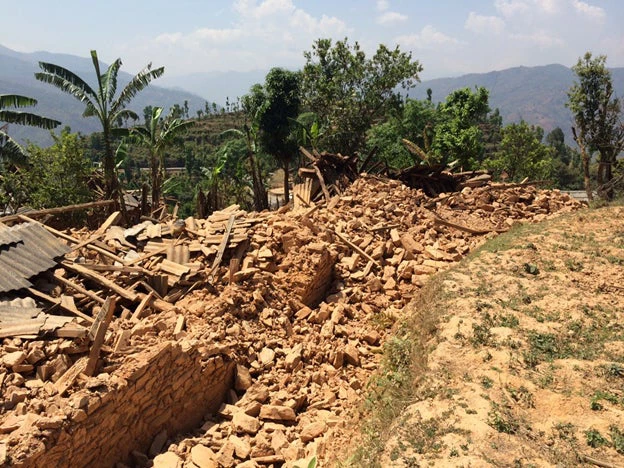
On Saturday I drove to Sindhupalchok, in the mid-hills of Nepal, to the northeast of Kathmandu. The narrow road climbed up and down the shoulders of the hills, along clear streams, through green forests and among fallow terraced fields with neat piles of cow dung waiting to be spread.
In the shade of a pipal tree, one girl sits picking lice out of the hair of another younger girl, her sister perhaps. The road is good, streetside shops are selling breakfast, or groceries, or other supplies, and along many parts of the road the scene from a distance is bucolic: calm, peaceful, normal.
But get closer, and it is quickly obvious that there is little that is normal in Sindhupalchok today. The farther we leave behind the richer neighborhoods of the Kathmandu valley, the deeper we reach into the rural areas, the greater the destruction of April’s earthquakes.
A few kilometers after we cross the Dolalghat River, we come across a hillside hamlet, Pauwathok, where only a few buildings remain standing. Plot after plot along the winding paths contains a ruddy, dusty pile of stone, brick, roof tiles and lumber, the rafters stained black from the indoor kitchen fires.
The women gather near the local temple or a visiting water bowser, or rummage through the rubble of their houses to retrieve what can be reused. An old lady laments the death of one daughter and worries about the fate of another, brought to the hospital in Dhulikhel, 30 km away.
Here and there, men work together to sort through the detritus of their houses—pulling out and stacking burnt-black rafters, retrieving any decent lumber, and sorting wood and stone into separate piles in the streets.
Relief workers and convoys have passed through, but so far no one has stopped to help.
Further along the highway, past many other small towns just as direly impacted as Pauwathok, we reach the district capital, Chautara, and are told that the road is open only to one-way traffic, from the other direction. We walk into what was once a small, but neat and vibrant, urban center, and are stunned by the destruction.
Two- to –five story houses, hung along either side of a narrow road on the crest of a ridge, have crumbled, or sagged, or teetered, or pitched into or away from the street. Heavy power lines droop low enough to be touched, buildings that once stood side by side have moved several feet apart, and nervous visitors scamper past unstable building fronts and ripped roadbeds.

Unlike in the valley or along the road out, virtually all the shops in Chautara are shuttered, and relatively few people are about. There is rubble everywhere, pushed to the verge of the road. Small numbers of men and women, a few with young children, walk desolately out of town, carrying a few shopping bags of things. A man on a ladder breaks into the second-floor window of his house, reaches in and throws pale-yellow corncobs and large metal bowls to a friend below.
In the few open shops, some of the keepers are stacking inventory at the door to be collected and carried away. In another a young woman, holding a baby and seated on the floor, blankly watches television while her reclining husband shouts on the telephone.
On the streets outside, young men on motorcycles race uphill, against traffic, while a few police and army vehicles drive past, presumably to greater emergencies beyond. Dutch, German and Korean search-and-rescue teams, in matching orange gear, stand about in groups. Foreign journalists lug huge cameras and microphones, and a camera-carrying drone buzzes overhead like an oversized mosquito.
It feels like a war zone. Many people have lost a great deal. Some have lost almost everything. It is hard to imagine how the people of this town can ever recover. It is easy to see, in their faces, an overwhelming sense of loss and dread, for what is past, and passing, and to come. For these people, the emergency is not over; it is barely beginning.


Join the Conversation